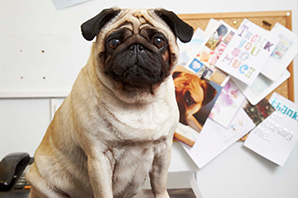What to know if you’re buying a small dog

There are lots of things to consider if you are buying a new dog. Tiny canines are great companions, and their small size makes them perfect for smaller homes and gardens.
Small dogs are known for being passionate, inquisitive and quick on their feet.
Petplan looks at the all the little things you need to consider if you’re thinking of getting a small dog.
A background to small dog breeds
Little canines are popular companion dogs. In the past, many small dog breeds were owned by wealthy members of the ruling class and bred as house pets.
Some were used as watchdogs while others were preferred as lapdogs.
Dog breeds that fall under this category include:
- Yorkshire Terriers
- West Highland Terriers
- Jack Russell Terriers
- Shih Tzu
- Pomeranians
- Bichon Frise
Small dogs are classed as being between 15 - 18 inches high and weighing less than 20 pounds. Dogs that are 10 inches or less can be referred to as miniature, pocket or teacup dogs such as the Teacup Chihuahua and the Teacup Pomeranian.
Small dog breeds can either come from very ancient lapdog lineages, or they can be smaller versions of a bigger dog breed. For example, the Miniature Poodle and Toy Poodle are scaled smaller versions of the actual Poodle.
What are the benefits of a small dog?
Small dog breeds can fit into just about any family and make great pets for the young, the old and everyone in between.
There is much to love about these little canines – their love, loyalty, playfulness, intelligence, curiosity and devotion to their families.
Small dogs can adapt to a smaller living and outside space, which is perfect for city dwellers, as they require less exercise than larger dog breeds – they also tend to shed less and eat less.
Choosing the right small dog breed
Just like big dog breeds, some smaller breeds will better suit your lifestyle and living space than others.
Once you have identified the breed you would like, it’s important that you do some background research on them.
Identify their care needs, personality and likely health issues. Don’t be put off by potential health problems that your dog may never suffer from. These should only be used as a guide to what could happen in the future as all dogs will differ.
With this in mind, make sure that you are financially and emotionally able to deal with the illness, should it ever occur.
Also ensure that you purchase the right puppy insurance or dog insurance to help with the cost of any treatment for unexpected accidents and illnesses.
When you are certain that you want a small dog breed, you can either look for reputable breeders in your area or adopt a rescue dog.
Training, feeding & exercise
Training your small dog
Despite their size, small dogs will be quick to take advantage and assume control of the household. It’s important to train your little pooch so that they understand the rules of the house and know who is in charge. Things such as house training are very much the same regardless of their size.
Feeding your small dog:
Once again, do not be fooled by their little bodies. Just like larger breeds, small dogs will eat anything they can get their paws on. It’s vital that your small dog has a balanced diet and does not come into contact with foods that can be harmful to them.
Exercising your small dog:
Don’t make the mistake of thinking small dogs will not need any exercise. Taking your little canine for walks is not only good for physical exercise, but also provides mental stimulation.. Make sure that you take your dog for regular walks and outdoor play.
Small dogs make fantastic pets and are great for just about everyone – singles, couples and those with families. They are playful, loyal and intelligent, and will bring much happiness to you and your family.
Do you have any experience owning a small dog breed? Let us know your stories below…

